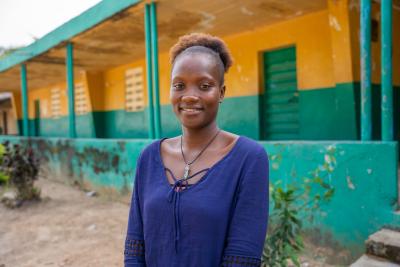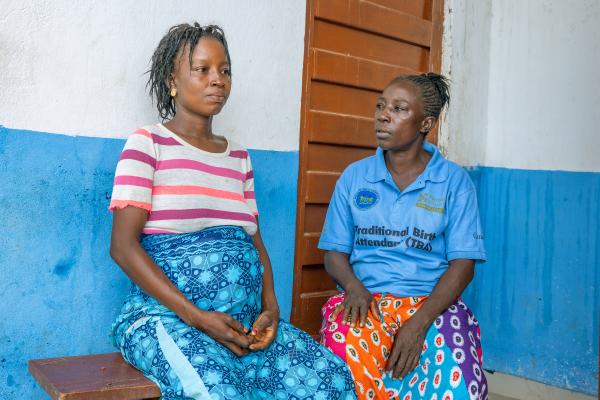At Partners In Health (PIH), we believe women’s rights are human rights. And that an investment in women and girls is an investment for all—from communities to families.
In the countries where we work, women have historically had some of the worst health outcomes. Fortunately, we’ve seen significant improvements, including a drastic decrease in maternal mortality in Sierra Leone after being among the highest in the world. Through a commitment to long-term accompaniment, PIH will continue to empower women and promote gender equity through health.
Below, learn about four ways PIH supports women’s health in Sierra Leone:
1. Partnering with traditional birth attendants
Traditional birth attendants are respected community members who offer support to women for all things pregnancy and childbirth related. They gain their skills through informal learning, including knowledge sharing with elders in the community. Many countries, including Sierra Leone, have laws that ban or restrict expectant mothers from relying on traditional birth attendants due to the dangers that women face during childbirth without supervision from a trained clinician.
To bridge the gap between tradition and a formal health care setting, PIH Sierra Leone employs traditional birth attendants.
Over the years, PIH has invested in thoughtful community engagement, outreach, and training to recognize the important role of traditional birth attendants. Since that investment, there’s been an increase in women willing to seek care at health facilities.
“When PIH came in, it stopped us from conducting home births and gave us the responsibility of referring all pregnant women to the hospital,” says Hawa Sawa, a traditional birth attendant. “We were trained on how to talk to patients and counsel them.”
Between July 2023 through June 2024, PIH Sierra Leone worked with 191 traditional birth attendants who made over 25,000 visits.
2. Empowering adolescents to discuss sexual and reproductive health
Adolescents have the right to safe and effective sexual and reproductive health services. Unfortunately, access to those services can be hindered by misinformation, societal beliefs, and lack of knowledge.
“We live in a place where girls still don’t understand the menstrual cycle and sometimes, they don’t come to school when they are on their period,” says Umu, a peer educator in rural Kono District.

Umu, a peer educator in Kono District, is passionate about breaking barriers for girls and women. While inspiring and educating others, she says she has improved her self-confidence and public speaking skills.
Photo by Abubakarr Tappiah Sesay / PIH
To address these barriers, PIH Sierra Leone established 10 programs at schools in Kono District to train peer educators about sexual and reproductive health. During a five-day training, peer leaders learn about menstruation, teenage pregnancy, sexually transmitted diseases, early marriage, and more. The youth leaders then spread the knowledge to their peers, reaching more than 100 students every year through small group discussions, school-wide assemblies, and educational games.
“When a student comes to me with a problem, I first calm them down and thank them for coming to me with their problem. I encourage them and make sure they know that it’s all going to get better,” says Umu, who also accompanies girls to PIH-supported facilities.
3. Supporting survivors of sexual and gender-based violence
Addressing sexual and gender-based violence and supporting survivors is essential to improving health care for women and girls. In Sierra Leone, PIH partners with the nonprofit Rainbo Initiative to provide survivors with free clinical, legal, and psychosocial support.
Survivors receive counselling and preliminary exams at Kono Rainbo Centre, then they’re referred to PIH-supported Koidu Government Hospital (KGH) in Kono District.
“As soon as the referrals come in, we attend to them. We don’t delay justice here,” says Dr. Emaudu Aribior Deen, KGH’s medical superintendent.
As part of these efforts, PIH has invested in increased training for KGH clinicians to stay informed about gender-sensitive care, reporting methods, and more—to provide high quality, dignified care to survivors.
Between April 2023 and March 2024, the Kono Rainbo Centre provided sexual and gender-based violence services to 216 survivors—most of whom were referred to KGH.
4. Developing a brand-new facility by women, for women
Alongside the Ministry of Health, PIH partnered with Build Health International to build the Maternal Center of Excellence (MCOE), which will open in January 2026. The brand-new facility is a 120-bed centre built by women (67% of the construction crew is female) for women.
With dedicated spaces such as a cutting-edge neonatal intensive care unit, labour and delivery suites, surgical units, and adolescent-friendly services, the MCOE is designed to meet the diverse needs of women and children while advancing global efforts to improve maternal health.
